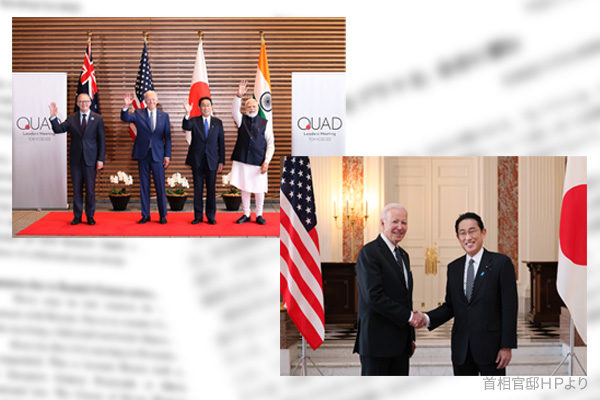A Japan-U.S. summit, the launching of the Indo-Pacific Economic Framework (IPEF) and a Japan-U.S.-Australia-India Quadrilateral Security Dialogue (Quad) summit in late May were significant for international economic order, signaling embryonic movements of change.
Multi-layered framework for economic security
First, a flag carried by international economic order is shifting from “trade liberalization” to “economic security.” Factors behind the shift include the decoupling of the global economy through the U.S.-China confrontation and supply risks caused by the novel coronavirus pandemic and Russia’s aggression against Ukraine. The shift is naturally resulting from the participation in new economic order by the United States and India that are reluctant to open their markets in the wake of their respective withdrawal from the Trans-Pacific Partnership (TPP) Agreement and the Regional Comprehensive Economic Partnership (RCEP) Agreement.
We now see a multi-layered big picture of international economic order. Japan and the U.S. has established a new “2 plus 2” ministerial dialogue for economic and diplomatic issues, added Australia and India for the Quad, and further added South Korea, seven ASEAN (Association of Southeast Asian Nations) members and others to launch the IPEF. Economic security measures are allocated to these frameworks according to their different levels of countering China.
Specifically, Japan and the U.S., which have advanced technologies, are set to cooperate in export control and research and development. The Quad is designed to promote cooperation in 5th generation (5G) mobile communications standard in which India is interested, semiconductor supply chain development, and cybersecurity. The IPEF is planned to step up cooperation in increasing the resilience of supply chains after Asian countries faced supply disruptions under the pandemic and world-wide semiconductor shortages.
IPEF based on Japan’s Asian strategy
Second, the key is how to draw developing countries into a new international economic order at a time when confrontation and division are deepening between the Group of Seven industrial democracies on one side and the two most powerful autocratic countries, China and Russia, on the other. In particular, Japan as an Asian country is in an important position to bridge between Asia and the West. The IPEF will become the first test for Japan. An issue in question is whether IPEF can offer actual benefits, taking Asian realities into consideration, without imposing Western values or rules to Asian countries.
Regarding decarbonization, for instance, Japan may provide Asian developing countries, which have no choice but to depend on fossil fuels in the immediate future, with financial and technological support for their realistic transition to the goal of carbon neutrality in 2050 based on their realities instead of a Western decarbonization approach that lopsidedly focuses on renewable energy promotion.
As for digital trade, Japan should first support business development using digital technologies, without pushing from the start rule making that may come after the development.
On supply chains, the promotion of international cooperation regarding data about strategic goods may help respond to supply disruption risks.
In these fields, Japan has already launched initiatives to provide Asian developing countries with business-linked actual benefits, such as the Asia Future Investment Initiative and the Asian Energy Transition Initiative. Such existing Japanese initiatives may be rearranged for the IPEF. Regarding IPEF, it is wrong to criticize Japan for just following a U.S. scheme. In fact, Japan is trying to draw the U.S. into Japan’s Asian growth strategy.
Masahiko Hosokawa is a professor at Meisei University and a former director-general of the Trade Control Department at Japan’s Ministry of Economy, Trade and Industry. He is also a Planning Committee member at the Japan Institute for National Fundamentals.


